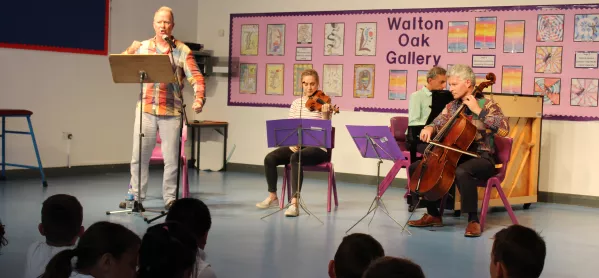- Home
- Polish to English: how one school is bridging the gap
Polish to English: how one school is bridging the gap

“Pewnego razu,” begins the storyteller.
On the fifth row, where he is sitting with his Year 6 peers, 11-year-old Olivier Szamrowicz’s eyes light up.
Olivier is the only Polish member of his class. And for the first time ever, something is happening in his school that focuses purely on his culture.
The storyteller is part of a performance celebrating Polish art and music, which is the result of a year-long project between Walton Oak Primary School, the Riverside Community Arts Centre and RC Sherriff Trust in Surrey.
The project aims to build a bridge between the two dominant communities in the area: English and Polish.
Susan Segal, chairman at Riverside Community Arts Centre, came up with the idea for the project.
“All we do for Polish children in schools is teach them English,” she says. “We have no cultural exchange, and the more I talked to people about the two communities, the more it became clear that the Polish people keep themselves to themselves within our town.
“They have a very strong culture which they foster in their children in their homes, they go to Saturday schools, on the whole they belong to the Catholic church and they have their own delis. If you walk through Walton you hear so many Polish speakers, but they keep totally separate.”
EAL students bring a ‘new dimension’
In 2015/16, Walton Oak School had an estimated 64 children out of a role of 504 whose families described themselves as ‘white European’: the bulk of these were Polish and Hungarian.
And while Segal saw plenty of work being done to support children with English as an additional language (EAL), she felt that not enough was happening to help the rest of the school to benefit from the new dimension that EAL learners bring to their classrooms.
“Apparently in the schools, the children don’t like to talk Polish, they almost pretend they are not Polish,” she says. “I knew we needed to do something to link the two communities together.”
And so the idea of a performance that would open English children’s eyes to a new culture, while giving Polish children an opportunity to learn more about their musical and literary heritage, was born.
The production, called “The Remarkable Tale of Prince Unexpected”, isn’t physically acted, but is read dramatically by storyteller Kevin Graal, who is accompanied by an original composition by Joseph Phibbs, played by the Barbican Piano Trio.
The original story brings together the “juicy” bits of Polish folk tales, says Graal. “It’s based on a Polish folk tale, but is based on six or seven variants of the same story.”
Throughout the year, Year 6 prepared for the performance, working alongside Graal on various storytelling tasks and recording their own descriptive sentences, which were played out during the production. They also took part in musical workshops with the Barbican trio and learnt the production’s songs off by heart, so that they could sing along with Graal on the day, while Year 4 and 5 followed their lead, reading from song sheets.
Giving Polish pupils ‘a sense of pride’
The experience was not only powerful for the pupils; it had a big effect on Graal, too.
“You should have seen [Oliver’s] face when he heard me say ‘once upon a time’ in Polish. I think it’s given him and his Polish friends here a sense of pride,” says Graal. “It’s that thing of everyone understanding that our stories, wherever we come from, are quite similar. It’s understanding that there are these bridges through arts and music that bring us together as one community.”
Olivier agrees. “It made me feel happy that Polish was included in the stories at school,” he says. “I have Polish books at home, and the stories are similar.”
His headteacher, Mandy Watts, is also pleased to see the children of her school coming together. She thinks that projects like this one are a step in the right direction for the whole community.
“We want to do anything that helps us to be part of the local community. My vision of the school is that it genuinely serves the local community in which it sits, which hasn’t always been the case,” she says.
Being a true part of that community means “being out there and being seen”, she adds. And by celebrating different cultures through art and music, Walton Oak Primary is making sure that everyone in the school can see pupils like Oliver.
Keep reading for just £1 per month
You've reached your limit of free articles this month. Subscribe for £1 per month for three months and get:
- Unlimited access to all Tes magazine content
- Exclusive subscriber-only stories
- Award-winning email newsletters



